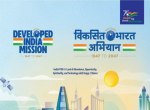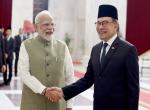The Preamble to the Constitution of India starts with the following words, “We, the people of India …” and ends with the words, “hereby adopt, enact and give to ourselves this Constitution”. The final arbiters of what happens in this country are the people and how they will fulfill their role is given in Chapter 2 of Part IV of the Constitution and Chapter 3 of Part VI of the Constitution, which provide for an elected Parliament at the level of the Union and an elected Legislature at the level of the States. India’s Constitution makes us a representative democracy, that is, every five years we elect persons who will represent us in Parliament and the State Legislatures and who, by their participation in the activities of the Legislature, will enact laws on our behalf, sanction the budget and generally call the Executive into question about its performance. Each one of us cannot sit in Parliament, but through our representatives we can make Parliament listen to us and function according to the larger mandate given by us collectively to our representatives. The value of each M.P. and each MLA is not so much that he occupy a seat in the Legislature, but rather that he represents our collective voices and his ultimate responsibility and accountability is to those who have elected him.
Is that how the representatives view themselves? Do they really believe that they are in office because the people have chosen them and that it is the people who are supreme and that the Members of Parliament and the State Legislatures are only in office because people have decided that they should be there? If the legislators realise that the people are everything and that they themselves exist because the people have put them there, then this would be a true representative democracy. Unfortunately that is not what happens in India because our MPs and MLAs, once they are sworn in, seem to think that they are independent individuals, subject to the party whip but otherwise free to plunder the very people who have put them in office. Every act of corruption on the part of an elected representative, especially if he also holds office as a minister and makes money illegally, makes him doubly accountable, first as a minister to the House, that is, Lok Sabha in the case of the Union under Article 75 (3) or to the State Legislature under Article 164(2). Secondly he is accountable to the people of India, especially his electorate which has sent him to the Legislature as its representative and whom he fails whenever he indulges in a corrupt practice. The people of India have a right to be annoyed with such a legislator because he has violated the mandate given to him by the people. Reverting to the Preamble, the Constitution promises to all its citizens’ social, economic and political justice, liberty of thought, expression, belief, faith and worship, equality of status and opportunity and fraternity which assures the dignity of the individual. Every time a legislator takes a decision or makes a recommendation which is based on such extraneous circumstances as a bribe, he denies both justice and equality to his constituents. Whereas this is an offence under the Indian Penal Code and the Prevention of Corruption Act, it is much more serious than an ordinary offence because the act violates the Constitution. Deliberately violating the Constitution of India to the detriment of the very people who have framed the Constitution makes the violator more than a criminal, it makes him a traitor. There can be only one penalty for a traitor, which is death and in terms of politics it should metaphorically mean death through writing finis to the political career of the guilty legislator. This power vests only in the people, the voters.
From 1967 when the purchase of power through engineering defections by bribery entered our political scene, the rules of politics changed. Now it became legitimate to try and capture power by means other than the ballot. In other words, the mandate of the people was replaced by the mandate of Kuber. From being representatives of the people, the elected persons became the predators of the people. I use strong words because the extent to which our politics has fallen cannot be expressed politely. To these predators not only were the people prey, they were also the means of somehow achieving the status of predator. Misled at the time of polls, the people were thereafter betrayed once the election had been won. For forty-seven years after 1967 our so called representatives were able to betray the people without the people reacting. That, however, did not mean that anger was not seething internally or that the people any longer had any faith in politicians. Initially the people experimented by sometimes bringing one party into power and sometimes another. In Madhya Pradesh, BJP and Congress alternated accordingly. However, by giving an unclear mandate in many States and at the Centre, the people made it known that they were not happy with any party. Unfortunately the political parties did not read the signals correctly and merrily continued with their unprincipled politics because there in lay a very lucrative source of personal gain. Wherever the people found an alternative they moved away from the dominant Congress Party. New coalitions were formed and changed from time to time and India entered into an era of coalition governments. Unfortunately this has not resulted in better government, less corruption and extension of social services and social infrastructure. Ultimately it seems that the people have had enough and the signal they are sending out is that they are prepared to back anyone or party which promises positive action. The victory of Narendra Modi, Shivraj Singh Chouhan, Raman Singh and Vasundhara Raje proves that religion based politics is not what the people favour. Instead the people want performance, are prepared to punish lack of performance and are prepared to vote for anyone who, in their opinion, is likely to provide better government. Ultimately in a democracy if elections reward performance or punish nonperformance, then that is one step forward in the process of democracy. It is an unfortunate fact that our parties, especially the Congress, have preferred manipulation of elections rather than sterling performance. That is why populism has replaced ideology, expediency has replaced programmes and projects and corruption has replaced honest government. Instead there is dependence on old shibboleths such as gareebi hatao, pseudo secularism and a belief that there are vote banks which can be exploited in order to gain and retain power. That is why Congress rode into battle like Don Quixote, mouthing platitudes which became dated forty years ago and only managed a tilt at wind mills rather than a presentation of ideology, ideas and programmes. This gimmickry has not worked. The net result is a drought of votes for the Congress.
It is into this vitiated atmosphere that Arvind Kejriwal and his Aam Aadmi Party entered. They represent the collective anger of the people and their message has cut across caste and religious lines. What is more, they broke the traditional vote bank of the Congress, namely, the scheduled castes and the minorities. This time round the traditional vote bank of the Congress voted en masse for Arvind Kejriwal and his group.
In the seventies of the last century, Jayaprakash Narayan launched his ‘Sampoorna Kranti’ (Total Revolution) because the people of India were fed up with corruption, misgovernment and lack of economic opportunities. Because the movement did not define itself in specific terms, nor laid down its specific objectives from which it would not budge, the Sampoorna Kranti fizzled out and in 1980 the same old faces which had declared a State of Emergency came to the forefront. The revolutionary zeal of the Sampoorna Kranti had been dissipated by the infighting, indecisiveness and corruption of the Janata Party Government. That is why the people of India convinced themselves that Indira Gandhi was a better option and in 1980 she was back in power. The attack on institutions, the slide in morality continued and once again the legislators forgot the very people who had sent them to the Legislature. It is in this context that one has to look at the performance of the Aam Aadmi Party to whom, I admit, I had not predicted more than three seats and who in fact emerged as the second largest party in Delhi in the assembly elections. Now the ambitions of Kejriwal have increased and he is eyeing other States and, perhaps the whole country as a means of himself achieving power. The people who have reposed faith in him may find it difficult to work with him because like Jayaprakash Narayan’s Sampoorna Kranti, the Aam Aadmi Party has still not evolved an ideology, a programme or plan which would make it a continuous and serious contender for political office. Activism is not a substitute for the hard slog in Indian politics. Does this mean that the Aam Aadmi Party will also go the Jayaprakash way?
One achievement of Kejriwal is that he has given a rude shock to the Congress and the BJP in the Delhi assembly elections. Whether his party expands, contracts or disappears will be of no consequence, provided that the shock he has administered to the mainstream parties results in the parties themselves applying suitable correctives and returning to their true role of offering themselves to represent the people, thereafter serving the people instead of preying on them. This would be a positive contribution by Arvind Kejriwal. Otherwise he will be a passing meteor flashing through the sky and then disappear.
I cannot help but look back on the Soviet experiment in Russia after the First World War. In fact, it is in 1905 after the crushing defeat of Russia in the Russo-Japanese war that Tsarist Russia’s basic weakness came to the fore and there was a revolt which forced the Tsar to concede some powers to the Duma, or Parliament. Unfortunately the situation was beyond gradual reform and when the Russian armed forces broke before the German onslaught, revolution was the only answer. It is from this that the Bolshevik Revolution led by Lenin overtook Russia, which signed a separate peace treaty with Germany, thus pulling out of the First World War in its closing stage. Lenin was very clear in his objectives. The Tsarist regime was to be completely dismantled and destroyed and the entire old social order of Russia was to be liquidated, especially the Kulak class of land owners and the Russian aristocracy. A dictatorship of the proletariat was to be established in which at the lowest level the Soviet was the form of both political and administrative organisation. At one level the regime was egalitarian in that it abolished the classes into which Russian society was divided. At another level the regime was extremely totalitarian in which the only arbiters of the fate of Russia and all Russians was the Communist Party. Post Tsarist Russia was not a democracy, there was no rule of law as we understand it and horrors and atrocities were committed in the name of Soviet ideology. Nevertheless Russia’s inexorable march to become the Soviet Union could not be stopped because Lenin and Stalin thereafter had their goals very clearly set before them. To my mind what we had in the Soviet Union was a Sampoorna Kranti, with whose methods and objectives I did not agree but which did pull the Soviet Union out of the Tsarist morass and made it into a truly powerful nation. Where the Soviets went wrong was that they did not gauge or understand how people change when they become more prosperous and that is what ultimately caused the Soviet Union to unravel. Even that is a contribution because it proved that a democracy which is vibrant and open to change is always a better form of government than any dictatorship, which tends to be swallowed up by the very rigidity of its own beliefs.
I make the above point because in Russia there was no direct transition from Tsarist rule to the Soviet Union because for about fourteen years there was the intervening period of an incomplete democratic regime. In India, the danger is that if the political parties continue to bicker, are effete, practice unconstitutional means, are corrupt and fail to give good government, then the likelihood is that the rot in the political system will continue. To the extent that Kejriwal and his followers have been able to project the collective anger of the people and the refusal to accept the old rotten system, this is a very positive thing in Indian politics. The question is whether our other mainstream political parties will read the signal, stop finding excuses for defeat and instead do some introspection so that the government envisaged by the Preamble is in fact established because the message of the Constitution is understood by the politicians and the political parties. The message is good government, strong but totally accountable, firm but honest and at all times in touch with ground realities and the aspirations of the people. I will be very surprised if the Aam Aadmi Party is able to convert itself into a true political party, but to the extent that it is a sounding board for what people are thinking that should be welcomed by all political parties. Ultimately we all Indians need to have a mirror held up to us so that we can see ourselves as others see us. Jayaprakash Narayan could have done it but he faltered and instead gifted us with a bunch of some of the most rapacious politicians. Will Kejriwal be up to it? That depends upon the extent of megalomania that descends on him as the paeans of praise engulf him. Will his feet then remain planted firmly on the ground? Unfortunately his present stance of making impossible demands and refusal to concede that there might be another point of view would suggest otherwise.
Published Date: 20th December 2013, Image source: http://2.bp.blogspot.com









Post new comment